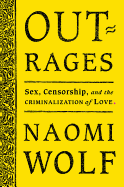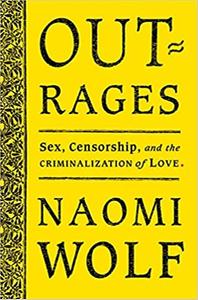
 With Outrages: Sex, Censorship, and the Criminalization of Love, Naomi Wolf tackles the history of legislation against homosexuality in the United Kingdom through the poetry, essays and life of a man her readers have probably never heard of: John Addington Symonds. This book harnesses the electric power of Walt Whitman's Leaves of Grass, the righteous energy of first-wave feminism and the terror of criminalized identities, in a style accessible to general readers. As the fight for LGBTQ rights continues, this book is as relevant as it is compelling.
With Outrages: Sex, Censorship, and the Criminalization of Love, Naomi Wolf tackles the history of legislation against homosexuality in the United Kingdom through the poetry, essays and life of a man her readers have probably never heard of: John Addington Symonds. This book harnesses the electric power of Walt Whitman's Leaves of Grass, the righteous energy of first-wave feminism and the terror of criminalized identities, in a style accessible to general readers. As the fight for LGBTQ rights continues, this book is as relevant as it is compelling.
Symonds (1840-1893) had the bad luck to come of age as a gay man just as Great Britain's legal system turned against men who loved men. He was a writer in a time of obscenity laws. And despite the grave danger--sodomy for a time was punishable by death--he kept writing. "This is one reason why Symonds's story, in the context of the history of censorship and the history of homosexuality, is so remarkable. The man just would not be silenced." On top of copious publications, Symonds left behind a trove of "secret poems," and a memoir that would not be published until nearly 130 years after his death.
While Symonds is not Wolf's central subject, he provides inspiration and continuity for a larger story, and his life provides the book's timeline. It opens with Symonds's youth and the 1855 publication of Leaves of Grass. Then it follows London's war against literal filth (human excrement in the streets, cholera, typhus) and the invention of the crime of obscenity (framed in parallel to that other filth, with its infectious properties), legislation of female bodies and what Wolf calls the laboratory of empire: Britain tried out increasingly stringent policies in its colonies before bringing them home. Wolf maps out the relationship between feminists' campaigns for marital and property rights and the new idea that male-male love was "disgusting" or "unnatural": "When women targeted the sexually abusive practices of heterosexual men, the outcome was a backlash by the heterosexual male establishment," or distraction techniques directed at gay men.
Meanwhile, writers and artists sought each other out clandestinely, using coded language and referring to the ancient Greeks, as censorship laws "had an immediate dampening effect on literature." Finally, Wolf tracks what she sees as a generational progression: Whitman influencing Symonds and then Oscar Wilde, who served two years' hard labor for "gross indecency." The book ends with Symonds's death and his legacy, the writings he published in his lifetime and those he left behind for a future society ready to receive them.
Wolf's style is easy to read, and her research is authoritative: this book is in part adapted from more academic work on the subject, and some of the most captivating scenes involve primary sources in the archives. Outrages is not only an important history with lessons for the present, but also an engagingly told story. The instructive life of Symonds is for any reader who cares about history, civil rights or the power of poetry. --Julia Kastner, librarian and blogger at pagesofjulia
Shelf Talker: Naomi Wolf examines poetry as social resistance and its ability to free its readers and its writers, the origins of homophobia and the battle against censorship in this gripping and vital history.

